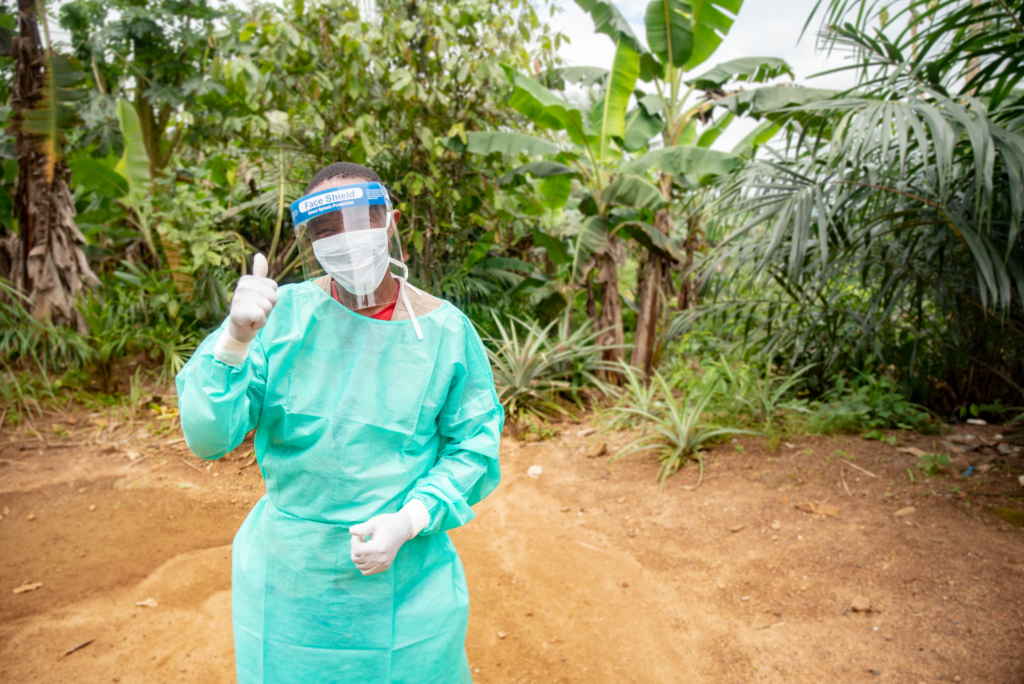Community health workers like Jerome Gardiner are the backbone of a resilient health system. For rural and remote Liberians, they are also the first line of defense against COVID-19.
Though Jerome’s formative years were marked by war, he was determined to complete high school and find ways to serve his community. In 2011, Jerome’s neighbors nominated him as a community health volunteer to promote healthy behaviors in his community. Then, during the 2014-2015 Ebola epidemic, Jerome answered the call to serve when the Government of Liberia asked for support in educating communities, tracing contacts, and rapidly referring patients to care in remote and rural areas. In the wake of the epidemic, Liberia’s Ministry of Health transitioned many community health volunteers like Jerome into paid, professional community health workers by training them to prevent, diagnose, and treat common health conditions.
Jerome is now employed as part of Liberia’s National Community Health Assistant Program, where he is a critical part of the country’s primary health system. Over the course of a few weeks, Jerome was trained in basic skills to diagnose and treat preventable diseases—from treating children for malaria and pneumonia and screening kids for malnutrition, to ensuring mothers have a birth plan to deliver in the clinic, to delivering contraceptives and screening for diabetes and high blood pressure. Upon completing his training, he was equipped with medicine and supplies like a smartphone with video lessons on topics like assessing a child for malnutrition. Now, Jerome serves the daily health needs of his neighbors.
“I met a guy that I helped before. He had a problem and I encouraged him to go to the health facility to get treatment. So he went to our local clinic and they referred him to Buchannan. When he got well, I met him and he said, ‘my brother, I most appreciate what you do. You helped me a lot. I just have to appreciate you and I can’t forget about you,’” explains Jerome.
With the nearest clinic more than five kilometers away, Jerome is able to team up with his supervisor and other frontline health workers to create a strong link to the public health system for patients who require additional care. Before the introduction of the national program, Jerome’s community didn’t have a trained midwife and pregnant women rarely visited the health facility. Now, thanks to community health workers like Jerome, women are receiving high-quality antenatal care services and are safely delivering babies in the facility.
“When I was growing up as a child there was no clinic, there wasn’t even a trained traditional midwife… but now things are changing. With [community health workers] that have a passion for the job, the community can be better,” recalls Jerome.
After growing up watching his community struggle to access healthcare, Jerome is a testament to what’s possible when clinicians, frontline, and community health workers work together to expand access to healthcare. In the future, Jerome hopes to continue serving his community by becoming a clinical supervisor.
When community health workers like Jerome are trained and supported to bring primary health services to the doorsteps of people living far from care, they can improve health outcomes and save lives. In Grand Bassa County, where Jerome is one of the 252 community health workers serving over 45,000* people, coverage of treatment for childhood illness like pneumonia, malaria, and diarrheal disease increased in districts implementing the National Community Health Assistant Program compared to districts that were not. In communities served by the national program in Liberia, community health workers now treat 45 percent of all reported malaria cases for children under five.
The Ebola epidemic propelled Liberia to extend the reach of its health system. As countries respond to COVID-19, investments in expanding access to primary healthcare through community health workers could help them defeat the virus, while also laying the foundation for a robust health system that is prepared to respond to future global health emergencies.
*Grand Bassa County, Liberia has an estimated population of 250,000, of this, the population within the districts served by the National Community Health Worker program is approximately 45,000.





